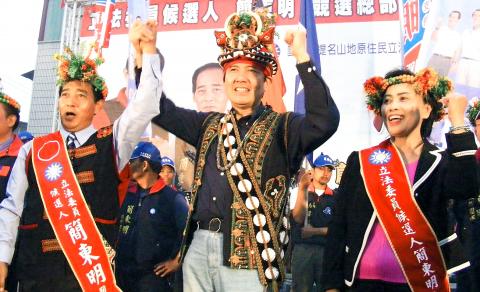The Pingtung District Court on Monday handed down guilty verdicts with prison terms to Chinese Nationalist Party (KMT) Legislator Chien Tung-ming (簡東明), also known by his Paiwan name, Uliw Qaljupayare, and 158 other people on charges of vote buying and accepting money in exchange for votes.
It was one of the nation’s largest ever investigations into vote buying in the run-up to the presidential and legislative elections on Jan. 16 last year.
The court ruled that Chien, campaign staff and other KMT officials had bought votes from Aboriginal residents in Pingtung County, paying from NT$1,500 to NT$3,000 per vote, a breach of the Civil Servants Election and Recall Act (公職人員選舉罷免法).

Photo: Lee Li-fa, Taipei Times
Chien, 66, was given a prison term of five years, six months and deprived of his civil rights for six years.
Besides Chien, 158 defendants were found guilty in Monday’s first ruling, which can be appealed.
Six officials at the KMT’s Pingtung branch office were convicted and given prison terms ranging from four years and two months to three years and six months.
The remaining defendants were Chien’s campaign office staff charged with acting as vote brokers for Chien’s camp and the KMT, and local Aboriginal residents who took money in exchange for promising to vote for Chien.
Chien lost his legislative seat on Monday when the guilty verdict was announced by the court, Ministry of the Interior officials at the Civil Affairs Bureau said.
However, Legislative Speaker Su Jia-chyuan (蘇嘉全) last night said that according to an amendment to election regulations, Chien would be suspected from his duties and rights as a legislator, but would retain his title of legislator.
Su said he would check with the legislature’s legal department to verify the law regarding the case.

Taiwan has received more than US$70 million in royalties as of the end of last year from developing the F-16V jet as countries worldwide purchase or upgrade to this popular model, government and military officials said on Saturday. Taiwan funded the development of the F-16V jet and ended up the sole investor as other countries withdrew from the program. Now the F-16V is increasingly popular and countries must pay Taiwan a percentage in royalties when they purchase new F-16V aircraft or upgrade older F-16 models. The next five years are expected to be the peak for these royalties, with Taiwan potentially earning

STAY IN YOUR LANE: As the US and Israel attack Iran, the ministry has warned China not to overstep by including Taiwanese citizens in its evacuation orders The Ministry of Foreign Affairs (MOFA) yesterday rebuked a statement by China’s embassy in Israel that it would evacuate Taiwanese holders of Chinese travel documents from Israel amid the latter’s escalating conflict with Iran. Tensions have risen across the Middle East in the wake of US and Israeli airstrikes on Iran beginning Saturday. China subsequently issued an evacuation notice for its citizens. In a news release, the Chinese embassy in Israel said holders of “Taiwan compatriot permits (台胞證)” issued to Taiwanese nationals by Chinese authorities for travel to China — could register for evacuation to Egypt. In Taipei, the ministry yesterday said Taiwan

‘LIKE-MINDED PARTNER’: Tako van Popta said it would be inappropriate to delay signing the deal with Taiwan because of China, adding he would promote the issue Canadian senators have stressed Taiwan’s importance for international trade and expressed enthusiasm for ensuring the Taiwan-Canada trade cooperation framework agreement is implemented this year. Representative to Canada Harry Tseng (曾厚仁) in an interview with the Central News Agency (CNA) said he was increasingly uneasy about Ottawa’s delays in signing the agreement, especially as Ottawa has warmed toward Beijing. There are “no negotiations left. Not only [is it] initialed, we have three versions of the text ready: English, French and Mandarin,” Tseng said. “That tells you how close we are to the final signature.” Tseng said that he hoped Canadian Prime Minister Mark Carney

POSITIVE DEVELOPMENT: Japan and the US are expected to hold in-depth discussions on Taiwan-related issues during the meeting next month, Japanese sources said The holding of a Japan-US leaders’ meeting ahead of US President Donald Trump’s visit to China is positive news for Taiwan, former Japan-Taiwan Exchange Association representative Hiroyasu Izumi said yesterday. After the Liberal Democratic Party’s landslide victory in Japan’s House of Representatives election, Japanese Prime Minister Sanae Takaichi is scheduled to visit the US next month, where she is to meet with Trump ahead of the US president’s planned visit to China from March 31 to April 2 for a meeting with Chinese President Xi Jinping (習近平). Japan and the US are expected to hold in-depth discussions on Taiwan-related issues during the